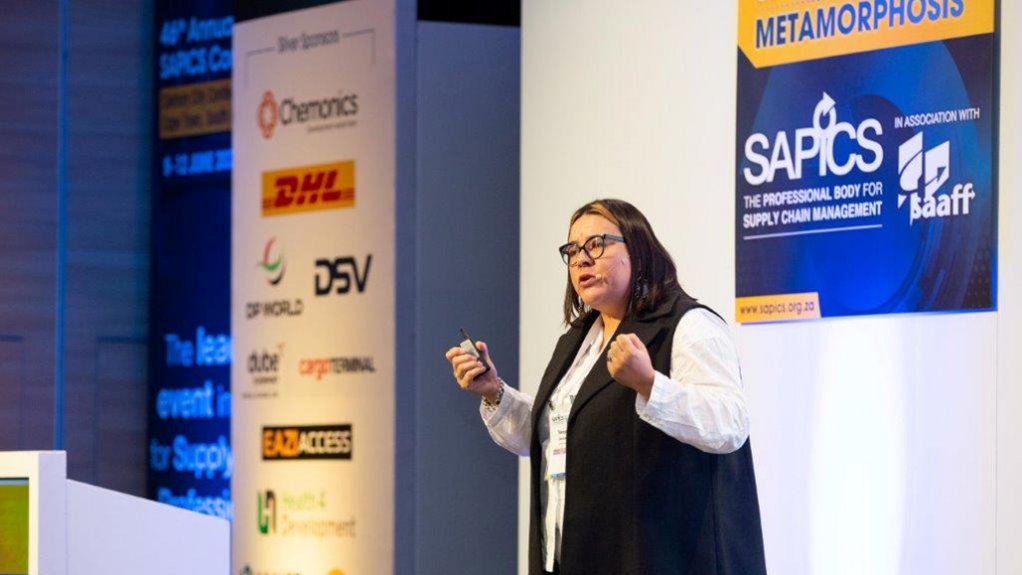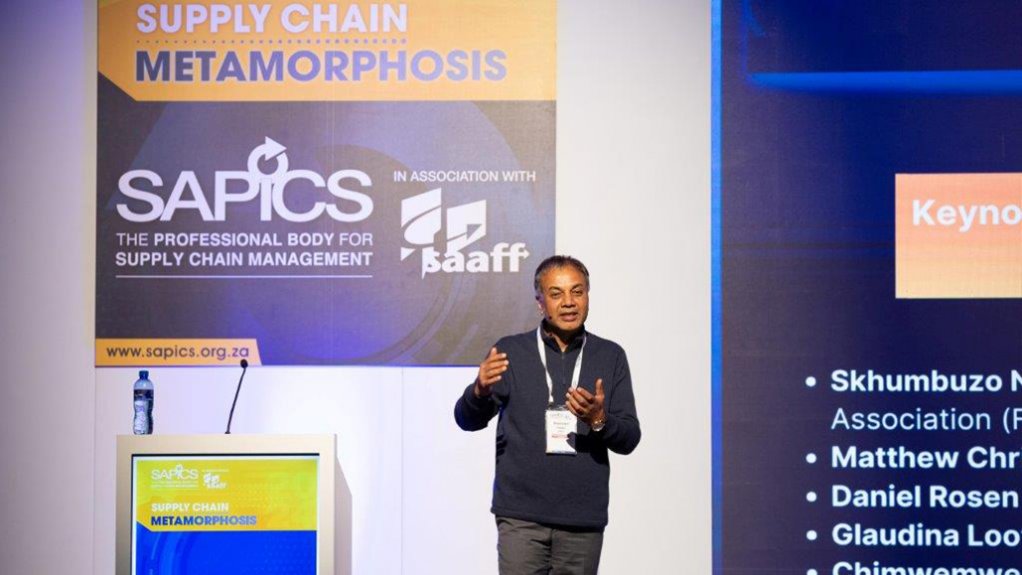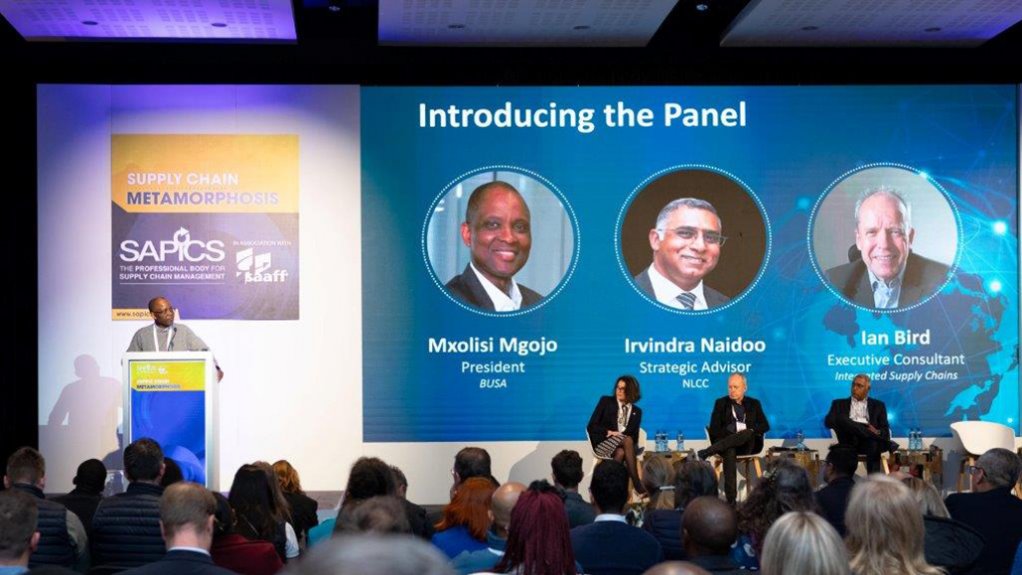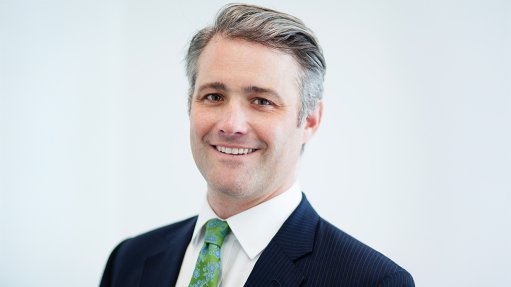Top supply chain conference unpacks South Africa's ports and logistics crises, life-threatening drug shortages, earth-saving sustainability initiatives




Vanya Jansen, winner of the Best Speaker Award
Prashant Yadav, winner of the Most Innovative Presentation Award
Panellists who reported on the operational progress made to date by the National Logistics Crisis Committee (NLCC) and the results achieved.
This article has been supplied.
The 46th annual SAPICS Conference saw more than 750 supply chain managers from 30 countries across Africa and around the world meet in Cape Town to explore this increasingly important profession’s current challenges and opportunities, to learn and share knowledge. The conference is the leading event in Africa for supply chain professionals.
According to The Professional Body for Supply Chain Management (SAPICS), which has hosted the conference since 1975, supply chain management gained prominence during the Covid-19 pandemic. It is an increasingly important and in-demand profession, SAPICS says, as ongoing volatility fuelled by geopolitical conflicts, climate crises and economic instability impacts global supply chains. Speaking at the opening of the conference, SAPICS president MJ Schoemaker stated that it is more critical than ever for supply chain managers to share and update their knowledge as change has become the only constant in the profession. This year, not-for-profit company SAPICS presented the conference in association with the Southern African Association of Freight Forwarders (SAAFF).
Held under the theme “Supply Chain Metamorphosis”, to reflect the changes in today’s dynamic supply chain landscape, the 2024 conference programme featured 128 African and international experts and thought leaders who shared their insights and expertise with attendees over three days. In a compelling update on the work of the National Logistics Crisis Committee (NLCC), Ian Bird, who is the Senior Executive responsible for the Transport and Logistics focal area at Business for South Africa (B4SA), reported on the operational progress made to date by the NLCC and the results achieved. He revealed that the number of trains cancelled on the North Corridor due to security incidents has been reduced by 50%. The length of the N4 border queue has been cut from 16km to 3km. A 36% reduction in container vessels’ waiting time at anchor has been achieved, along with a 73% reduction in the number of vessels at anchorage.
Crucial discussion on South Africa’s ports
In a crucial discussion on South Africa’s ports, panellists representing Transnet and business debated the impact of Transnet’s monopoly, non-investment and the growing imperative for public-private partnerships to upgrade port terminals, back of port solutions and infrastructure like rail. “Competition breeds efficiency,” stated Oscar Borchards, acting managing executive for the Western Cape Transnet Port Terminals. He and panellist Brenda Magqwaka, who is the general manager at the Office of the commercial executive at Transnet, revealed that the state-owned enterprise had benchmarked its port terminals against those in Singapore and Thailand. Borchards noted that compared to Thailand’s Laem Chabang port, the critical issue to be addressed in South Africa is the “boldness to invest and bring in redundancy”. “Even though Transnet is a monopoly, we realise we cannot go it alone,” Magqwaka told SAPICS Conference delegates. Antoinette van Heerden, logistical affairs manager at the Fresh Produce Exporters’ Forum South Africa, stressed that South Africa is competing on fruit exports with South America where there are large ports, large vessels and low slot costs. “It is critical to focus on how to get out of the hole we are in quickly, and we need oversight to ensure that we do not end up here again. We must get to the point where we can get our fruit out at the port where we need to get it out. We can rough it for two more years, but after that, we need to see service excellence,” Van Heerden stated.
While supply chains get goods from manufacturers to end users, they also save lives. Strong healthcare supply chains are critical to get lifesaving medicines and health commodities to where they are needed, when they are needed, including to the most vulnerable communities. Recognising this, the 2024 SAPICS Conference featured a global public health supply chain track running throughout the event. These sessions examined topics ranging from last mile distribution challenges across Africa to the successful use of drones for the delivery of blood, medicines and snakebite antivenom. Artificial intelligence’s role in reducing drug shortages by analysing huge volumes of data faster than any human could was also explored, along with the power of public-private partnerships to enhance public health supply chains.
Focus on circular supply chains and sustainability
As our natural resources dwindle and carbon emissions rise, circular supply chains are becoming more critical than ever. Circularity and sustainability were the focus of several absorbing sessions at the 2024 SAPICS Conference. An important new book, “Sustainable Supply Chain Orchestration”, co-written by world-renowned circular supply chain expert Deborah Dull and supply chain management leader Douglas Kent, was launched at this year’s conference. Dull and Kent introduced SAPICS Conference attendees to their “UNLEARN” model, a framework outlined in their book and designed to foster sustainable practices in an organisation. “Our supply chains have been designed to drive cost efficiencies, optimise delivery times and ensure product quality. However, this focus has contributed to unsustainable practices that compromise the well-being of our planet and society. We can no longer tolerate excessive packaging, inefficient logistics which increase greenhouse gas emissions, single-use plastics, exploitive labour practices, improper waste disposal or chemical runoff. Supply chain leaders have an enormous impact on sustainability and a critical role to play in shaping a better tomorrow,” Dull said.
At the closing dinner that ended the conference on a festive note, prizes were awarded to the following outstanding speakers and exhibitors:
Best Speaker: Vanya Jansen
Most Innovative Presentation: Prashant Yadav
Best Panel Discussion: Market Shaping for Drones
Best Workshop: Mbuso Nkosi
Best Written Paper: Oliver Jones and Luis Freitas
Best Booth: GS1
Best Single Unit Exhibition Stand: Webfleet
Best Multiple Unit Exhibition Stand: Interrol
In addition to learning and networking, the SAPICS Conference organisers and delegates also found time during the conference to give back to those less fortunate. At a “Rise Against Hunger” meal packaging event, conference attendees packed 6 000 meals for disadvantaged communities.
The Gold sponsors of the 2024 SAPICS Conference were SAP and VillageReach.
Article Enquiry
Email Article
Save Article
Feedback
To advertise email advertising@creamermedia.co.za or click here
Press Office
Announcements
What's On
Subscribe to improve your user experience...
Option 1 (equivalent of R125 a month):
Receive a weekly copy of Creamer Media's Engineering News & Mining Weekly magazine
(print copy for those in South Africa and e-magazine for those outside of South Africa)
Receive daily email newsletters
Access to full search results
Access archive of magazine back copies
Access to Projects in Progress
Access to ONE Research Report of your choice in PDF format
Option 2 (equivalent of R375 a month):
All benefits from Option 1
PLUS
Access to Creamer Media's Research Channel Africa for ALL Research Reports, in PDF format, on various industrial and mining sectors
including Electricity; Water; Energy Transition; Hydrogen; Roads, Rail and Ports; Coal; Gold; Platinum; Battery Metals; etc.
Already a subscriber?
Forgotten your password?
Receive weekly copy of Creamer Media's Engineering News & Mining Weekly magazine (print copy for those in South Africa and e-magazine for those outside of South Africa)
➕
Recieve daily email newsletters
➕
Access to full search results
➕
Access archive of magazine back copies
➕
Access to Projects in Progress
➕
Access to ONE Research Report of your choice in PDF format
RESEARCH CHANNEL AFRICA
R4500 (equivalent of R375 a month)
SUBSCRIBEAll benefits from Option 1
➕
Access to Creamer Media's Research Channel Africa for ALL Research Reports on various industrial and mining sectors, in PDF format, including on:
Electricity
➕
Water
➕
Energy Transition
➕
Hydrogen
➕
Roads, Rail and Ports
➕
Coal
➕
Gold
➕
Platinum
➕
Battery Metals
➕
etc.
Receive all benefits from Option 1 or Option 2 delivered to numerous people at your company
➕
Multiple User names and Passwords for simultaneous log-ins
➕
Intranet integration access to all in your organisation




















